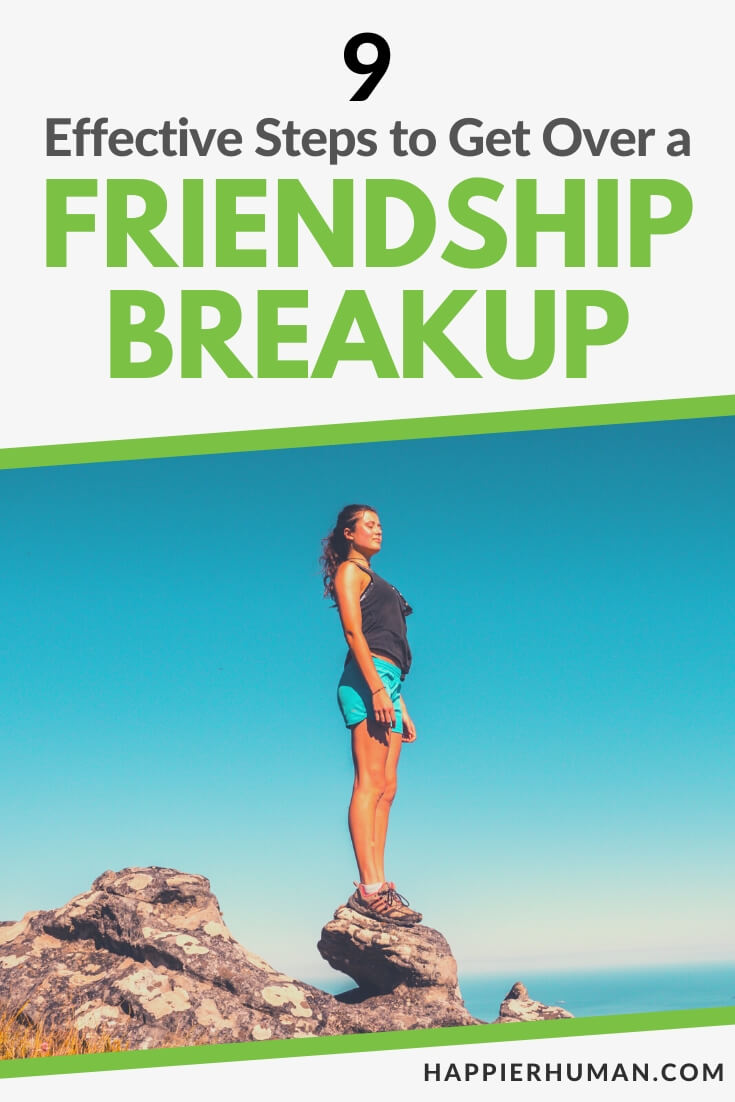Romantic partners come and go, but your true friends will always be there for you. But what if something happens and you and your friend break up?
A friendship breakup can (and usually does) hurt more than when you have your heart broken by your lover, and it probably feels like your heart has a gaping hole because your friend is sitting with a huge chunk of your heart.
During the trauma of the breakup, you wonder if you’ll ever get over it and if you’ll be able to move on and find a genuine friend again. The quick answers are that you will get over it and you’ll move on but it won’t be easy and it won’t happen overnight.
If you’ve recently broken up with a friend or know of someone who’s lost their bestie, follow or share these effective steps to get over and move on after the friendship breakup.
What Is a Friendship Breakup?
A friendship breakup is when your friendship with someone ends. It’s like a romantic breakup, but it is often worse. A true friend becomes your family because they are your safe space, your loudest cheerleader, your biggest supporter, and your partner in crime.
There are various reasons why friends break up. Most often, friends are like seasons. Some come into your life to teach you or support you, and then they leave.
Others stay for a longer period. But when you break up, it’s simply because the season(s) has passed and it’s time to move on.
Other reasons for not maintaining the friendship include:
Why Does a Friendship Breakup Hurt So Much?
When a friendship ends, it hurts. And it hurts badly.
A 2017 study that was published in Personal Relationships stated that friends become increasingly more important the older you get. After all, friendships are a vital part of life. We all need friends because they meet a few of the fundamental needs we have:
You aren’t meant to be alone; humans survived best as part of a tribe and that’s what your friends are – your tribe.
So when a friendship doesn’t work out, some of your basic needs aren’t being met. Sure, you may have other friends, but you’ll only truly grieve the friendship from the one(s) you counted on the most and who meant the most to you.
Plus, that bond’s been broken, and while you can find a new friend, will they really fill the void in your heart? And a platonic breakup means that things won’t be the same.
The meaningful connection is lost so you can’t call your bestie over for coffee or send them that funny meme (and know they won’t judge and think you are weird – in a bad way).
Of course, the end of a friendship hurts in different ways depending on whether you are calling it quits or if you’re being left behind.
Friendship Heartbreak When You Are Ending the Friendship
“You’ll always be the deepest scar on my heart.” ~ Cassia Leo
It’s not easy to take responsibility and end a friendship. And it’s one of the worst decisions you’ll agonize over.
Is it the right thing to do?
Or should I keep this person in my life even though they … cheated with my husband, have been financially abusing me, or only ever takes and takes and takes some more.
Then you have to decide how you are going to end things, adding to the hurt and stress you already feel. And when your friend isn’t part of your life anymore, they’ll be the deepest scar on your heart because it’s like you’ve had to cut your own limb off.
Friendship Heartbreak When You Are on the Receiving End
“The shattering of a heart when being broken is the loudest quiet ever.” ~ Carroll Bryant
When you are the friend being broken up with, you may have had an idea of what was coming, or it may catch you completely off guard. Either way, when your friend ghosts you or tells you it’s over, you’ll feel like your heart is shattering into a million little pieces.
And it won’t get better. Your friend may not explain the reasons behind their decision to end the friendship and they may not give you a chance to apologize or make things right.

It’ll be done and dusted … except it isn’t, because your friend isn’t your friend anymore. And now what? Who do you turn to? What do you do? Your person isn’t your person anymore, and there’s suddenly a big sad empty space.
The feelings of betrayal, anger, sadness, guilt, and grief can linger for a long time as you adjust to life without your bestie.
9 Steps to Get Over a Friendship Breakup
There is no easy or quick way to get over a friendship, and if you do, then ask yourself if it was really a friendship with genuine connection.
To help you accept and move on when your friendship with that special someone is no more, follow these steps.
1. Are You on a Break, or Is It a Breakup?
“A broken friendship can be a comma or a full stop. You choose.” ~
The first step to help you get over the end of a friendship is asking yourself (and your friend if you can) whether you are on a break or whether it is an actual, real friendship breakup.
And no, this isn’t like “the Ross and Rachel ‘were they on a break?’ situation” from Friends.
You and your friend can decide whether the “breakup” is a comma or pause so you can both breathe and get perspective, or if it’s a permanent “full stop” end.
However, it’s always your choice to remain in the friendship, but that also means you should never allow an abusive friendship to continue.
A worthwhile friendship can be saved with a greater investment and better communication from both you and your friend. Deciding whether it’s worth it is the challenge.
Here are some questions to help you clarify:
2. Make Your Mental Well-Being a Priority
Your prime friendship is the one with yourself. All other friendships flow from that. When a friendship with someone else threatens your primary friendship with yourself, you risk your mental well-being.
Realizing a friendship hasn’t kept track with your personal development or has become toxic can signal that it’s time to cut a friend loose.
However, this can be traumatic as you have a hole in your life that resembles the actual death of someone you care about. It can be compared to switching off life support for a loved one.
The decision can be excruciating, but it’s ultimately about what’s best for them and you, especially when the friendship is already terminal.
Try these ways of maintain better mental health:
3. Seek Resolution (If Possible)
The questions and “what ifs” of a breakup are what haunts us. You don’t always know the why, what, or how, which causes confusion and obsessive thoughts.
Only by working at developing a better understanding of what happened and why your friendship has broken will you begin to find closure.
Resolution of your friendship helps you stand firm and move toward the goal of understanding and clarity. To do this, you need to bear in mind that:
Develop a plan of action by:
4. Validate Your Emotions
A friendship fracture can leave you devastated. One of the ways we hide our pain is to deny it, but this is like sewing shut an ulcer and hoping it will heal if we forget about it. Only by validating your feelings can you begin to drain the pain from the wound and heal.
Own up to exactly how the breakup makes you feel. Do you feel angry, sad, rejected, shamed, guilty, or embarrassed?

While people around you may tell you to “get over it” because it’s not like you were lovers, you have every right to be as devastated by the friendship “divorce” as you are about losing a lover.
While you can’t always count on the support or understanding of people around you, you have to give yourself the encouragement, safety, and support you need to heal. You can feel what you feel, without needing to apologize or justify.
It’s your friendship, your heart, and your choice.
Self-validate your feelings by:
5. Forgive Yourself
It’s a natural reaction to want to blame yourself when your friend ends the relationship. You feel like you messed up, that it’s your fault, or that you somehow deserved this.
Stop.
Ultimately, a friendship is a partnership, and you both contributed to the friendship not working out. So, while we should own up to our actions and mistakes, you’re not the bad guy here.
Move from thinking about the breakup as a failure to seeing it as a learning opportunity. If you were not invested enough, you can learn to be more present and participate in your next friendship.
You don’t have to keep reminding yourself that you caused this pain. Instead, let it go and let yourself off the hook. Your future friendships will depend on how well you learn from this breakup.
Practice forgiveness of yourself and your friend. They wronged you, and you likely failed them too. But, not forgiving means you keep grinding at each other like the parts of a rusty hinge.
Forgiveness can help you both move on and find peace. Learn to forgive by:
6. Get Some Distance
When you are too close to a fire, you can’t see the flames, but you can feel the heat. The same applies to a friendship fracture.
You may find that if you are too close to the pain, you can’t see your way out of it. Instead of finding a way to carry on, you simply wallow in the agony.
Getting a little distance can help you get some perspective on what happened and the road ahead. So start small. You don’t have to move to a different city to get away from your former friend.
Instead, begin packing up the things that remind you of them. Put their gifts into storage, place their photos in envelopes, and temporarily block them on social media.
Switch off reminders of activities you did together (like gym pick-up reminders) and begin doing new activities and go to new places.
Withdrawing from shared activities, such as no longer coaching the local soccer team together, can help you breathe and distance yourself a bit. Stepping back lets you think with clarity and develop resilience.
Of course, the questions from your mutual friends and acquaintances can be murder when you just want to step away from it all.
Here are some great ways to avoid things getting awkward with family and shared friends:
7. Try to Find the Silver Lining and Lesson
While you should learn from failures, there could be a silver lining to really being honest about what happened with your friendship. Does this happen to you a lot? Are your friendships all short term and prone to failing? Why?

Find the patterns in your friendships, and you will find the way to get the answers. The painful lesson may be worth it if you can begin to do things differently so your next friendship is a keeper.
To discover the lesson, ask yourself:
8. Make New Memories and Form New Habits
The pain of a friendship fracture can lead to painful memories haunting you, and your daily habits and rituals may no longer make sense.
This is a great time to begin making new memories and building new habits that will have more value to you.
Try leaving your comfort area, taking up new and unexpected hobbies, and hanging out with new and unique people.
You may find your old friend had been holding you back once you start to experience the world around you without them.
Get into the new memory-making business with this checklist:
9. Invest in Healthy Relationships and Rebuild Your Ability to Trust
A breakup can truly damage your ability to trust and how you view yourself and other people in your life.
You may find that you are hesitant to open your heart and get close to someone again after the shock and devastation of a friendship breakup.
But take the time to move through the grieving process by taking it step by step and don’t close yourself off to new friends.
Work on rebuilding your ability to trust and emotionally connect and form new healthy (and secure) attachments (or friendships).
Use these action steps to rebuild trust and invest in healthy relationships:
Final Thoughts about Dealing with a Friendship Breakup
“A broken heart is the worst. It’s like having broken ribs. Nobody can see it but the pain is unbearable every time you breathe.” ~ Unknown
It absolutely sucks when you and your friend break up, and it hurts like hell. You’ve just lost someone you’ve trusted and known for a long time, and there will be a huge empty space in your heart and your life.
You can get over the platonic breakup by:
If you are a good friend to someone (and this is reciprocated), it isn’t likely that your friendship will die. So become an even better friend by following these steps.
And if you think the friendship breakup was the worst idea ever, then check to see if your friend or bestie was your anam cara. Here’s a guide with 15 signs that someone is your true soul friend.
And if you're looking for more resources on friendships, be sure to check out these blog posts:
- 7 Ways to Meet People & Make New Friends After College
- My Friends Leave Me Out: 9 Ways to Cope with It
- 39 Movies about Friendship and Being with Great People


